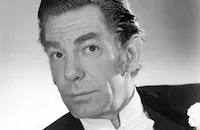The Man in the White Suit

Brief Synopsis
Cast & Crew
Alexander Mackendrick
Alec Guinness
Joan Greenwood
Cecil Parker
Michael Gough
Ernest Thesiger
Film Details
Technical Specs
Synopsis
Sidney Stratton, a humble inventor, develops a fabric which never gets dirty or wears out. This would seem to be a boon for mankind, but the established garment manufacturers don't see it that way; they try to suppress it.
Director

Alexander Mackendrick
Photo Collections
Videos
Movie Clip





Film Details
Technical Specs
Award Nominations
Best Writing, Screenplay
Articles
The Man in the White Suit
Unbeknownst to the managers of the Corland Textile Mill where he works, Sidney Stratton (Guinness) has been secretly developing an indestructible fabric resistant to dirt using the company's equipment and money. When the owner of the mill, Michael Corland (Michael Gough), discovers Sidney's costly experiment, the inventor is quickly fired. But though shy and reclusive, the eccentric Sidney is also remarkably determined, and begins his work anew at Alan Birnley's (Cecil Parker) rival textile mill.
It is there after a series of explosions that Sidney finally creates his perfect material. But an invention that would seem to guarantee a fortune for the company instead sets off a deep crisis in the industry. Lowly workers and corner office bosses alike begin to wonder how they will continue to make money if this indestructible fabric renders them useless. Sidney's only allies are two women, one the outspokenly pro-labor shop steward Bertha (Vida Hope) and the other Birnley's rebellious daughter Daphne (Joan Greenwood from Kind Hearts and Coronets, 1949), who is disgusted with her father's and fiance; Corland's underhanded, money-obsessed tactics.
The Man in the White Suit is a razor sharp satire of the limited vision and cutthroat tactics of the business world founded, not on innovation, but on conservatism. Everyone, from the managerial class to the labor class, is equally indicted for participating in a capitalism founded on waste and graft.
"Each character in the story was intended as a caricature of a separate political attitude, covering the entire range from Communist, through official Trades Unionism, Romantic Individualism, Liberalism, Enlightened and Unenlightened Capitalism to Strong-arm Reaction. Even the central character was intended as a comic picture of Disinterested Science," said Mackendrick of the film. According to the book, Lethal Innocence: The Cinema of Alexander Mackendrick by Philip Kent, Mackendrick's "film can also be seen as a subversive portrait of Ealing itself...Such a reading is supported by the 'private' level of satire built into the film, with certain characters expressly modeled on members of the studio team - most notably the mill-owner Birnley...whose flustered, paternalistic liberalism is borrowed from Michael Balcon [Ealing studio head]. Not only was Birnley given several of Balcon's pet phrases, but Mackendrick told Cecil Parker, who played the role, to 'model yourself on Mick'....Other caricatures included Frank, the shop steward, based on Sidney Cole, the film's producer and a staunch union man; and the bustling, bossy nurse who slaps Alec Guinness's face, 'an absolute portrait of our studio nurse,' according to Mackendrick."
Cited by the National Board of Review as one of 1952's best foreign films, The Man in the White Suit also received an Oscar nomination for its screenplay penned by playwright Roger MacDougall -- Ealing's foremost writer/director from 1949-1955 -- John Dighton and Mackendrick. Proving his ability to handle sophisticated, droll satire, Mackendrick would go on to direct the comparably scathing American film Sweet Smell of Success (1957).
Alongside Guinness, the film's other star was the luminous white suit fashioned from Sidney's miracle fabric, which he wears in the film's second half. Fourteen of the suits were crafted from luminously treated rayon, and a tissue paper version was created for the final disintegration scene. Luckily this classic Ealing comedy has lasted longer than that fragile suit.
Director: Alexander Mackendrick
Producer: Michael Balcon
Screenplay: Roger MacDougall, John Dighton, Alexander Mackendrick
based on the play by Roger MacDougall
Cinematography: Douglas Slocombe
Production Design: Jim Morahan
Music: Benjamin Frankel
Cast: Alec Guinness (Sidney Stratton), Joan Greenwood (Daphne Birnley), Cecil Parker (Alan Birnley), Michael Gough (Michael Corland), Ernest Thesiger (Sir John Kierlaw), Howard Marion-Crawford (Cranford), Duncan Lamont (Harry), Henry Mollison (Hoskins), Vida Hope (Bertha). BW-82m.
by Felicia Feaster

The Man in the White Suit
Quotes
Trivia
The strange noises made by the laboratory apparatus were produced for the sound track by a tuba and a bassoon.
Miscellaneous Notes
Released in United States 1951
Released in United States March 1975
Released in United States 1951
Released in United States March 1975 (Shown at FILMEX: Los Angeles International Film Exposition (Science Fiction Movie Marathon) March 13-26, 1975.)
Re-released in United States November 16, 2012
Re-released in United States November 16, 2012


















